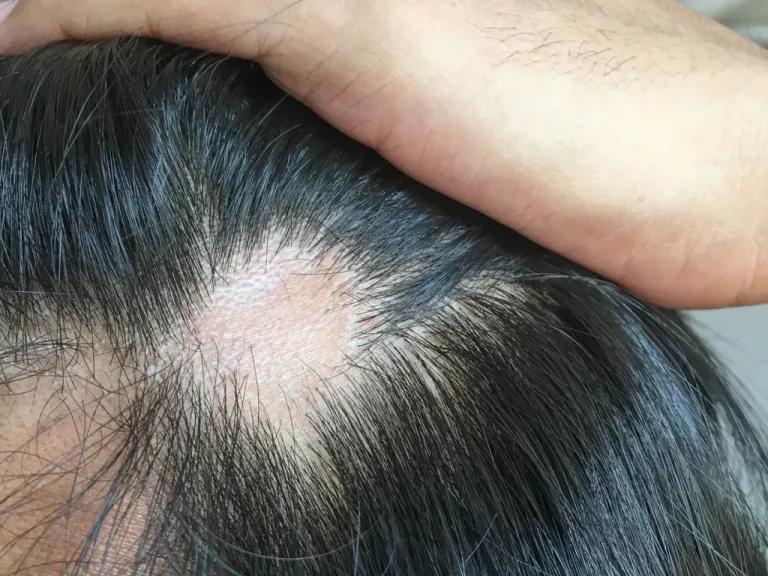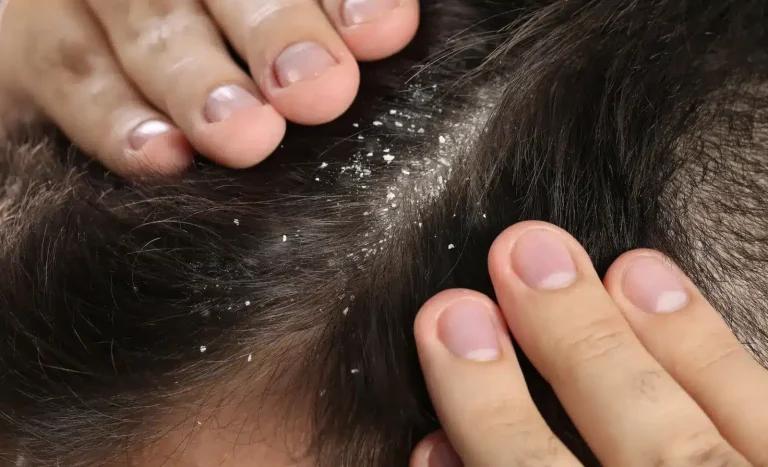Alopecia areata is a hair loss condition that can be distressing and impact self-esteem and confidence. Understandably, you’re probably looking for information on how to stop alopecia areata from spreading. There may be ways to prevent this hair loss from getting worse. Let’s dive into understanding alopecia areata, its causes, triggers, and how to prevent it from spreading.
📝 What is alopecia areata?
Alopecia areata, also called patchy alopecia areata, causes hair loss in patches. It will usually happen in small patches around the size of an inch, but these patches can get bigger, creating larger areas of hair loss. Alopecia areata is an autoimmune disorder in which the immune system mistakenly attacks hair follicles, causing inflammation and patches of hair loss.
Types of alopecia areata:
- Diffuse alopecia areata: Sudden, unexpected thinning of hair over the whole scalp. This is rare
- Alopecia barbae: Patchy hair loss on the beard
- Alopecia ophiasis: Band or strip of hair loss on the scalp
- Alopecia totalis: Loss of all scalp hair
- Alopecia universalis: Hair loss on the entire scalp and the entire body. This is in severe cases
🦠 Causes of alopecia areata
Autoimmune condition
The immune system misidentifies hair follicles as threats. Furthermore, individuals suffering from autoimmune diseases, including allergies, atopic dermatitis, psoriasis, thyroid disease, and vitiligo, exhibit a higher propensity for alopecia areata spreading.
Additionally, nutritional deficiencies (vitamin D, biotin, amino acids, zinc, B3) can also elevate the chances of alopecia areata.
Genetics
There is often a genetic link. About 20% of people with alopecia areata have a family history with at least one family member who also has the disease.
📈 What triggers the spread of alopecia areata?
There are also environmental factors that can trigger alopecia:
Poor nutrition
Believe it or not, poor nutrition plays a role in hair loss, with certain dietary factors directly impacting hair follicle health and overall hair strength. Without sufficient protein in the diet, hair growth can slow or become more fragile. Hair is made up of keratin, a protein, and low levels can lead to weaker hair structure and increased shedding.
Iron deficiency can lead to hair loss. Women are more susceptible due to menstrual cycles. Vitamin D deficiency can lead to less new hair follicles. Vitamin B12 deficiency can lead to less red blood cell production and oxygen transportation. Lack of biotin reduces the amount of keratin in the body leading to thinning hair.
High sugar consumption
Excessive sugar intake can increase inflammation, disrupt insulin levels and create hormonal imbalances that negatively impact hair growth.
Processed foods
These types of foods often lack essential nutrients and contain inflammatory compounds that can affect hair health.
Rapid weight loss
Sudden caloric restriction can shock the body, forcing hair into the resting phases of its growth cycle, causing excessive shedding of hair.
High-stress levels
Emotional and physical stress can trigger or worsen episodes of alopecia areata.
Viral or bacterial infections
Viral or bacterial infections can cause your immune system to become more active and increase inflammation.
Smoking
Smoking increases the production of inflammatory cytokines in your body.
Disturbed sleep
Not getting enough sleep may affect the activity of your immune system.
📋 What are the symptoms of alopecia areata?
- Sudden hair loss in patches. This is the common common sign of alopecia areata. You might notice smooth, round or oval bald patches appear on your scalp, beard, eyebrows or other areas where you have body hair. The hair loss can happen very suddenly and overnight
- Uneven hair loss. While alopecia areata typically causes circular or apathy bald spots, it can sometimes appear as a more diffuse thinning of the hair across the entire scalp, particularly in women. This can be more subtle and might be mistaken for general hair loss
- Brittle nails. Changes in your nails can sometimes accompany alopecia areata. You might notice your nails pitting, developing ridges or becoming more brittle and prone to breaking
- Scalp sensitivity or itching. In some cases, people with alopecia areata experience itching or burning sensations in the areas where hair loss will soon occur
- Clumps of hair falling out. You might notice more hair coming out when you brush or comb your hair, or even small clumps of hair in the shower or on your pillow
💉 Are there any effective treatments to prevent alopecia areata from spreading?
There is no known cure, but the treatment of alopecia areata might be able to slow down future hair loss or help hair grow back more quickly. Treatment options for alopecia areata include:
Medication
- Minoxidil
Minoxidil is a medication commonly used for pattern baldness, but is also used for alopecia areata. It can help hair to regrow or slow down its loss. Finasteride is another medication that can promote hair regrowth and slow hair loss.
- JAK inhibitors
JAK inhibitors such as deuruxolitinib, ritlecitinib and baricitinib are oral prescription medications used to treat alopecia areata. Barcitinib is used to treat adults who have severe alopecia areata. It’s a once-daily pill. Deuruxolitinib has been approved to treat adults with severe alopecia areata. It’s a pill that you take twice a day. Ritlecitinib has been approved to treat adults and children 12 years of age and older who have alopecia areata that has caused extensive hair loss.
This type of medication calms the overactive immune system, which may allow your hair to regrow. It’s a promising treatment for people with widespread hair loss.
- Corticosteroids
Corticosteroids can be taken in different forms. Corticosteroid injections into the scalp or topical corticosteroids are applied to the scalp as a cream or ointment into the affected areas.
- Oral immunosuppressants
Methotrexate and cyclosporine are immunosuppressant drugs that block the body’s immune response.
All these medications have side effects that need to be discussed with your healthcare provider before use.
Immunotherapy
Topical immunotherapy is used when there’s a lot of hair loss or if it happens more than once. Chemicals are applied to the scalp to produce an allergic response. If successful, this reaction makes the hair grow back. It is repeated several times to maintain the new hair growth.
Light therapy
Light therapy, also known as phototherapy uses various wavelengths of light to stimulate the hair follicles and promote hair growth. This treatment has shown promising results, but more research is needed to establish its effectiveness.
PRP treatment
Platelet-rich plasma (PRP) injections involve using platelets from your blood to promote healing in damaged tissues. It encourages the body’s natural healing process by stimulating tissue repair. When injected into your scalp it promotes healing and revitalises hair follicles, supporting healthier hair growth.
Other options for hiding hair loss
- Shaving. Some people prefer to shave so they can get rid of that patchy or diffuse look rather than covering up
- Wigs. Can hide hair loss on the scalp or alternatively a headscarf
📝 What lifestyle changes can help manage alopecia areata?
Improved diet
Vitamins are used by your body’s cells for a wide range of functions. They help your cells create energy, absorb other nutrients and protect themselves from damage. If your cells don’t get enough of the vitamins and nutrients they need they can’t work as well as they should. This is just as true for the cells in your hair.
By consuming more of the following foods you can help reduce hair loss and thinning of hair:
- Lean proteins such as fish, chicken, and legumes
- Iron-rich foods spinach, red meat, and lentils
- Foods rich in omega-3 fatty acids such as salmon, and chia seeds
- Zinc-containing foods such as pumpkin seeds and oysters
- Antioxidant-rich fruits and vegetables such as citrus fruits, cherries, strawberries, kiwis, kale, broccoli and Brussels sprouts
Stress-reducing techniques
Incorporating stress-reducing techniques, such as journalling into your life is proven to reduce anxiety and stress levels. Many people find it cathartic, as it can release your emotion onto the page, declutter the mind and offload thoughts, without anyone’s opinions coming back at you. Also adding a gratitude journal to your daily routine encourages you to focus on the positive aspects of your life. Regularly noting down what you are thankful for contributes to increased overall well-being and mental health.
You can also try yoga, meditation, and mindfulness exercises to help manage your stress levels.
Improve sleep
Regular exercise has been proven to have a positive impact on sleep as well as mood, mental alertness and a reduction of stress. Aim for at least 30 minutes of activity most days of the week, ideally outdoors if possible. It promotes feelings of well-being and it may be as effective as antidepressant medications for mild to moderate mental health disorders. Exercise is thought to dampen activity in regions of your brain that are activated by stress, like your amygdala.
Better hair products
Cut out hair products and treatments that contain harsh chemicals. Gentle shampoos and conditioners without silicones and parabens are better choices. Avoid using heating tools and treat you hair gently when brushing and styling.
🏥 Diagnosis
A healthcare professional can help:
- To understand the underlying cause, medical history, family history and identify triggers if possible
- Examine the scalp and perform a biopsy
- Carry out blood tests to assess for any other medical conditions
A dermatologist or a healthcare professional will develop a personalised treatment plan that suits your type of hair loss.
📝 Conclusion
Alopecia areata can be a challenging condition to deal with, but can sometimes just be dismissed as cosmetic. The impact can however go much deeper for those living with it. It is about self-worth, confidence and adjusting to the visual changes. Combining lifestyle changes with medication may offer the best approach to managing the condition. We hope this article has given you some great tips on how to stop your alopecia areata from spreading.
Sources
- Hair loss types: Alopecia areata diagnosis and treatment
- Alopecia Areata: Symptoms, Causes, Treatment & Regrowth
- British Association of Dermatologists
Medical Disclaimer
NowPatient has taken all reasonable steps to ensure that all material is factually accurate, complete, and current. However, the knowledge and experience of a qualified healthcare professional should always be sought after instead of using the information on this page. Before taking any drug, you should always speak to your doctor or another qualified healthcare provider.
The information provided here about medications is subject to change and is not meant to include all uses, precautions, warnings, directions, drug interactions, allergic reactions, or negative effects. The absence of warnings or other information for a particular medication does not imply that the medication or medication combination is appropriate for all patients or for all possible purposes.








